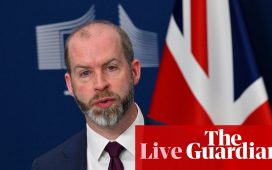Key events
Closing summary
Jeremy Hunt, the UK chancellor, told business leaders in a meeting that the current level of energy support is “unsustainably expensive” and that the current £18bn scheme was always limited to six months.
Any future support, while at a lower level, will be designed to avoid a cliff edge. The Treasury will announce the outcome of the review of the energy bill relief scheme in the House of Commons next week.
However, experts say that the fall in wholesale gas prices due to mild winter weather means that the cost of energy support to the Treasury is falling.
Sainsbury’s is giving its lowest-paid workers their third pay rise in a year, taking hourly wages to at least £11, amid fierce competition for shop workers and soaring living costs for employees.
Credit card borrowing in the UK soared in November to its highest monthly level since 2004 amid mounting pressure on households from the cost of living crisis.
The latest snapshot from the Bank of England showed individuals borrowed an additional £1.5bn in all forms of consumer credit, of which £1.2bn was on credit cards, as concerns mounted over the impact of high inflation on struggling households.
Coinciding with the beginning of the Christmas shopping period and rising energy bills, the jump from October’s £700m in unsecured borrowing prompted concerns among anti-poverty charities that some people were turning to expensive forms of credit to make ends meet.
Our other main stories:
Thank you for reading. We’ll be back tomorrow. Bye! – JK
Paul Ashworth, chief North America economist at Capital Economics, says: “Weaker ISM shows activity stalling, but labour market conditions remain tight.” He explains:
The decline in the ISM manufacturing index to a two-and-a-half year low of 48.4, from 49.0, is another sign that the economy was losing momentum at the tail-end of last year. Nearly all the survey-based evidence points to a complete stagnation or even contraction in activity.
Reflecting the shift from goods shortages to over-abundance, the supplier deliveries index slipped to 45.1, from 47.2. That is the lowest reading since the peak of the financial crisis in March 2009. The prices paid index dropped to only 39.4, from 43.0, leaving it only slightly above the pandemic nadir of 35.3 in April 2020.
Elsewhere, the private job openings rate was unchanged at 6.8% in November, while the hiring rate edged down to 4.3%, from 4.4% and the separations rate edged up to 4.2% from 4.1%. The Fed will be disconcerted to see the private voluntary quits rate edging back up to 3.0%, from 2.9%, but that rate is still well down on the peak of 3.4% in November 2021.
US manufacturing decline worsens – ISM report
The downturn in US manufacturing intensified in December, according to a closely watched survey.
The monthly report from the Institute of Supply Management showed a further decline to 48.4 from 49 in November, marking a two-and-a-half-year low. Any reading below 50 indicates contraction. The new orders index dropped to 45.2 from 47.2, pointing to a sharp decline, while employment improved, with the index jumping to 51.4 from 48.4. But in a sign that the weak global backdrop is hurting US manufacturers, the new export orders index fell to 46.2, from 48.4.
It comes ahead of the minutes of the Fed’s December meeting, out at 7pm GMT, which will be closely scrutinised for any clues to further interest rate hikes.
Weak US economic activity & inflation signals – manufacturing ISM falls to 48.4 (contraction), prices paid index slumps to 39.4.
But labor market still looking resilient – JOLTS job openings dips only slightly to 10.46 mln vs upwardly revised 10.51 mln.
Mixed signals for Fed.
— Jamie McGeever (@ReutersJamie) January 4, 2023
Hunt: business energy support ‘unsustainably expensive’
Jeremy Hunt, the UK chancellor, told business leaders in a meeting that the current level of energy support is “unsustainably expensive” and that the current £18bn scheme was always limited to six months.
Any future support, while at a lower level, will be designed to avoid a cliff edge.
The Treasury will announce the outcome of the review of the energy bill relief scheme in the House of Commons next week.
The Treasury said in a statement.
No Government can permanently shield businesses from this energy price shock.
The chancellor was clear that this level of support is unsustainably expensive and that the current scheme was always time limited to six months.
Extending the scheme at current levels could cost tens of billions of pounds, with costs potentially doubling or tripling if international energy prices increase further than expected. It is vital that taxpayer’s exposure to volatile international energy prices is reduced.
However, the chancellor also heard the concerns of the business community who are facing high energy prices and explained that any future support, while at a lower level, would be designed to help them transition to the new higher price environment and avoid a cliff edge in support.
RMT leaders urge ministers to ‘intervene in a positive manner’
On day 2 of the train strikes across the UK, leaders of the RMT union have urged the government to get round the table with unions to end the row over pay, jobs and working conditions.
Gordon Martin, the union’s regional organiser in Scotland, called for ministers to “intervene in a positive manner”.
Scottish first minister Nicola Sturgeon has already urged the UK transport secretary to “intervene immediately”.
Martin said that while there have been “warm words” from transport secretary Mark Harper, “we need those warm words to go into action, and we need action on the real concerns”.
He said ministers were seeking to impose conditions the RMT “cannot and will not accept”, including driver-only operation on trains, the closure of booking offices and cuts to maintenance schedules.
Speaking on BBC Radio Scotland’s Good Morning Scotland programme, he said:
What we’re looking for is cool heads and brave hearts, sit round the table and properly negotiate, not just try and ram through the wish-list of the UK Government, because our members will not accept that.
We need ministerial involvement, we need decision makers to be in the room, because we’ve had offers on the table that have then been taken off the table through UK Government intervention.
We need them to intervene in a positive manner, not a negative manner, and let’s get this sorted and get people back to work.
Sainsbury’s hands lowest-paid staff third pay rise in a year

Sarah Butler
Sainsbury’s is handing its lowest-paid workers their third pay rise in a year, taking hourly wages to at least £11, amid fierce competition for shop workers and soaring living costs for employees.
The supermarket chain said it was awarding the 7.3% rise to 127,000 workers, up from £10.25 an hour previously, which will be implemented early in February. It puts Britain’s second-biggest supermarket chain on a par with the discounter Aldi – which also raised pay to £11 this month – and well ahead of rivals Tesco, Asda and Morrisons.
The pay increase, which is now above the voluntary “real living wage” of £10.90, comes five months after Sainsbury’s last raised starting pay and just under a year after a previous rise.
As part of the latest package Sainsbury’s will also extend an offer of free food during shifts for store and depot staff – first introduced by the company in October – by a further six months, after it was due to end in March.

Cost to Treasury of subsidising home energy bills falls by £5bn, experts say

Alex Lawson
The predicted cost of subsidising household energy bills to the Treasury has fallen by £5bn after a drop in wholesale gas prices, a leading consultancy has said.
Cornwall Insight has forecast the government’s policy to protect households from the cost of living crisis – the energy price guarantee (EPG) – will now cost £37bn.
Gas prices have fallen sharply in recent days amid mild weather and signs that European gas storage levels are higher than expected, after a scramble to replace Russian supplies. If wholesale gas prices remain low through the year, the cost of subsidising bills will significantly reduce.
The consultancy said in November that it expected the EPG to cost £42bn over 18 months, after the chancellor, Jeremy Hunt, made the policy less generous.
Liz Truss had pledged during her brief tenure as prime minister to keep average bills at £2,500 for two years at an estimated cost of between £72bn and £140bn.
The intervention spooked financial markets and Hunt later made it less generous, keeping average bills at £2,500 until April and £3,000 for a year afterwards.
Martin Beck, chief economic advisor to the EY ITEM Club, is expecting a double-digit drop in house prices this year as the market cools rapidly.
The financial market turmoil that followed late-September’s mini-Budget had largely disappeared by the start of November. However, the more stable financial market backdrop offered no support to the housing market, with mortgage approvals falling to 46,075 in November, from 57,875 in October. Excluding the pandemic periods, this was the lowest level since April 2011.
Net mortgage lending of £4.4bn was up on October’s level, but this was a legacy of transactions set in train earlier. The EY Item Club expects that both lending flows and residential transactions are likely to fall back in Q1 2023. Indeed, though the financial market backdrop has improved, it has only reduced the extent to which house price valuations, based on mortgage affordability, are stretched, so the EY Item Club expects that a double-digit correction in prices remains likely.
Data on unsecured lending and household deposits continue to give the impression that consumers have limited appetite to push against the pressures of falling real incomes by borrowing more or saving less. Though net unsecured lending rose to £1.5bn in November, from £0.7bn in October, this was entirely due to a notable drop in repayments, with gross lending falling back. And households added £5.7bn to their stock of deposits in November, well above the pre-pandemic norm of £4.2bn a month.
However, there are reasons to be cheerful. Beck adds:
On balance, the EY Item Club still thinks that consumer savings will come to at least the partial aid of the economy. The financial turmoil from late last year may have encouraged greater precautionary saving, but conditions have calmed on those fronts. Survey evidence collected by the Bank of England just before the mini-Budget found that higher-income households are reducing their monthly savings to cut back spending by less. And other major economies, notably the US, have seen excess savings drawn down to a significant extent.
Here’s more reaction to the sharp drop in UK mortgage approvals in November.
JPMorgan economist Allan Monks says:
Approvals began declining following the political turmoil seen during September and October. November brought some political and market stability, although mortgage rates remained high, the market remained disrupted, new buyer enquiries were still low, and house price declines accelerated in the month.
The question is whether this downward spiral will continue, or instead give way to some form of stability. We expect house prices to fall further and for housing market conditions to remain weak, but there is still a case for expecting an element of the latter in the near term.
First, market conditions have stabilised and mortgage rates have fallen back from the highs. Although the November data show show that quoted mortgage rates remained stuck near 6%, timelier web based data currently show rates down closer to 4.50-4.75%. This improvement is likely to be limited by further BoE tightening, although we do expect the Bank to pause after 1Q.
Second, the labor market is broadly holding in as wage growth remains outright strong, and signs of a genuine recession dynamic remain absent. This could change, but the PMI moved further away from recession levels in December, job vacancies remain high and consumer confidence has now shown three consecutive monthly increases through to December. The RICS housing survey helps to track momentum. This survey continues to highlight falling prices and declining demand. But a limited supply of property also appears to be keeping the market tight, while new buyer enquires did show a modest move higher in November.
Sacha Lord, the night time economy adviser for Greater Manchester, has called for support “at its fullest” to be offered beyond March, when the current energy support scheme for businesses expires.
He said:
I am encouraged to see efforts being made by the chancellor today to meet with business groups and understand the battles being faced across the board.
We need a clear, urgent and defined strategy outlining how business owners across the UK can survive the expected surge in costs.
Support at its fullest must be maintained for UK companies when the current scheme comes to an end in March to prevent closures, and I urge the chancellor to understand the depths of the crisis and listen to the swathes of business voices across all industries calling for help.
The UK’s industry sectors are intertwined, and after the jolts of the past three years and the resolve that all industries have shown in their bid for recovery, it would be a failure of this new government to simply stand by and let business fall at the last hurdle.
British Gas owner asks Citizens Advice for help in protecting rivals’ customers

Alex Lawson
Also on the energy front, British Gas owner Centrica has expressed “profound concern” over the financial resilience of some of its competitors in the domestic energy market and has written to Citizens Advice to ask for support in its efforts to protect consumers.
Centrica’s group general counsel, Raj Roy, has written to the charity’s chief, Dame Clare Moriarty, to voice concerns over the regulator Ofgem’s recent consultation on the financial health of energy suppliers.
Centrica wants Citizens Advice to add its weight to calls to disclose whether a customer’s credit balance is fully protected on their bill from a supplier going bust, and hopes planned minimum capital requirements can be introduced more quickly.
Ofgem is attempting to prevent a repeat of the circumstances that resulted in nearly 30 suppliers collapsing over the past two years at a cost of £2.7bn to taxpayers, plus billions more to cover the bailout of the biggest casualty, Bulb.
Chemical industry chief: ‘Widespread concern’ over cut in energy support
As the government prepares to cut the help with energy bills it is giving businesses, with Jeremy Hunt, the chancellor, expected to meet leaders from the UK’s biggest business groups at lunchtime, the chief executive of the Chemical Industries Association has talked about the industry’s worries.
Asked on BBC Radio 4’s Today programme how concerned the association’s members are that energy support will fall, Stephen Elliott said:
There would be a lot of widespread concern over a significant reduction in the level of support.
Credit where credit’s due. The relief measures from October last year through to March have made a difference. They have helped business.
He added:
Only last week we actually got confirmation that some businesses were actually included within the scope of that relief, so it’s taken time for some clarity”.
We’re very interested to learn about what will happen from the end of March.
Throughout 2021, and pre the Russian invasion, we’ve been looking for more targeted support with government. More can be done for a targeted intervention for energy intensive sectors such as chemicals.

Disabled people among hardest hit by cost of living crisis

Richard Partington
Disabled people in the UK are much more likely to struggle to heat their homes and cut back on food this winter, according to a report highlighting “massive” income gaps amid the cost of living squeeze.
Research from the Resolution Foundation found people with disabilities had an available amount to spend that was about 44% lower than that of other working-age adults, exposing them hugely to the rising cost of essentials.
The thinktank said there was a chasm between the underlying disposable incomes of people with a disability (£19,397 a year) and the non-disabled population (£27,792), according to analysis of official figures and a YouGov survey of just under 8,000 working-age adults, more than 2,000 of whom reported a long-term illness or disability.
Highlighting the risks to households struggling with the highest rates of inflation since the early 1980s, it said almost half (48%) of disabled adults said they had to cut back on energy use this winter, compared with almost one-third of people without a disability.






